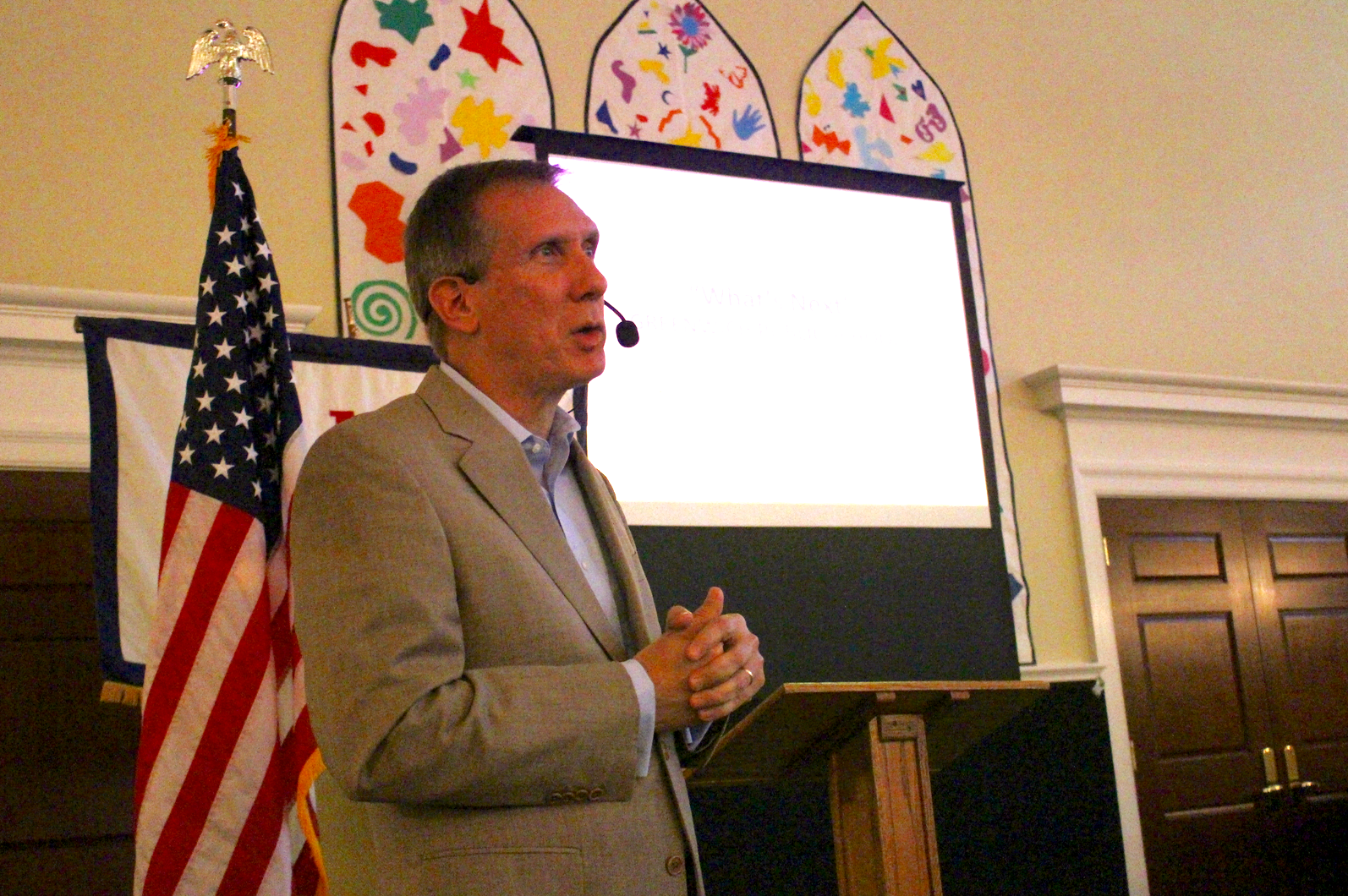Board of Education Chair Peter Sherr addressed the Retired Men’s Association on Wednesday.
Some of the topics he covered were collaborative learning and personalized learning vs ‘factory model of education.’ He also talked about state funding and state mandates.

Board of Education chair Peter Sherr addressed the Retired Men’s Association on July 26, 2017 Photo: Leslie Yager
But first, Mr. Sherr shared the story of his own education.
He said his parents married and had children while still in college, but managed to go on to masters degrees in Business and English respectively in the early 1960s.
As a child, his parents gave him the gift of pre-school, which he noted was not de rigueur at the time.
His family moved to Wilmette, IL and later to England, before moving to Los Angeles, where he said he made the error of enrolling “across the street” at UCLA before transferring to UConn.
In Illinois, Sherr said he was one of 35 children in a classroom, referring to the 1950’s “factory model of education” where classrooms, including those in Greenwich’s elementary schools, are optimized for rows of desks.
Later, in Los Angeles, when children were being bused 45 minutes to an hour to public school, Sherr said parents put him in a private school that was focused on college admission.
Sherr said that while his education followed a track that is familiar to the RMA members, “the factory model of education” is now obsolete.
“Kids need skills for the 21st century, but they’re learning in schools built for the 1950’s,” he said. “Their world needs to look like this: Collaborating in small groups, using a lot of technology, and the teacher may not even be in the classroom.”
Toward that end, he said Greenwich Schools need to be reconfigured.
“We have 15 schools in Greenwich: 11 elementary, 3 middle schools and GHS. Particularly, the elementary schools were all built perfectly for the 1950’s model. And they’re beautiful.” But, he said, the rooms were designs for rows of desks.
“Teachers have to figure out how to reconfigure for collaboration. We’ll have to look at how to change them cost effectively so that we don’t kill the tax payers.”
Mr. Sherr said students need to be prepared for a world that is much more competitive, in schools that are more diverse.
“I grew up in places that were like homogenized milk. I got that when I started traveling around – I spent a lot of time in India, China and Latin America. I want that for my kids… This hasn’t been the reality, traditionally.” – Peter Sherr
On the topic of competition, Sherr said his daughter applied to 15 colleges and got into 13 before settling on studying in Scotland.
Quoting educator Karl Fisch, Sherr said, “We’re preparing students for jobs that don’t exist, using technologies that haven’t yet been invented, in order to solve problems we don’t even know are problems yet.”
He described the US higher education system as the envy of the world. “Everyone wants to come to the US to go to our universities,” he said. “But nobody models us on K-12 education.”
He said his own daughter left Greenwich Schools with a deficiency in math.
Horst Tebbe said that in Greenwich there have been at least three recent methods of teaching math. “At least two crashed and burned, what are we doing to make sure math is a success?”
Sherr said that program coordinators are responsible to decide what what will be taught and how for each subject.
“That’s their job,” he said. “We had a math coordinator who is no longer in the job. He introduced ‘Everyday Math.’ We were not having the results in mathematics we would have liked.”
In some ways it was interesting what Mr. Sherr did not speak about.
He did not mention potential charter change that could leave the Board of Education with 5 members from one party and 3 from the other.
Nor did he mention the change in school start time that will have GHS starting an hour later in just over a month.
Mr. Sherr lamented Greenwich’s relationship with the state in terms of funding, and mandates Greenwich must pay for.
Public schools are “an organ of the state,” he said, adding that the state has a big role in setting standards, including proficiency standards and standardized testing.
He said Greenwich, with a population of 63,000, sends between ¾ of billion dollars and 1 billion dollars in taxes to Hartford every year, and between 8% and 13% of personal property taxes for the state.
He said the Town of Greenwich doesn’t get back very much.
“Once in a while the state paves Route 1, and they pay for certain programs,” he said, adding that Greenwich used to get economic cost sharing grants from the state to the tune of $6 million to $7 million a year. “As the Connecticut situation has contracted, the governor zeroed that number out.”
Sherr said that as a result, next year Greenwich Schools will be all locally funded, despite state mandates including the one for racial balance, that create an expense for the town.
He said that as a result of requirements for racial balance, Greenwich came up with a plan for New Lebanon School in Byram.
“As part of that, we’ll build a brand new elementary school, which needs to be upgraded anyway,” he said. “We decided to go all-in as part of the racial balance plan because the state was going to share the cost with us.”
Now, he said, “The question is, ‘Would we be building what we’re building if we weren’t getting money from the state?”
“The state committed to us money to build New Lebanon. We expect that to happen. It’s not helpful to have a contentious relationship with Hartford,” he said.